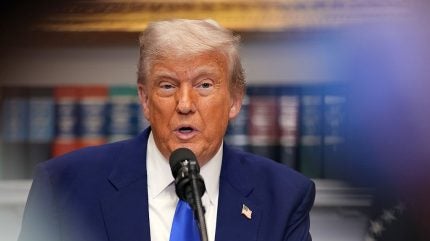
US President Donald Trump has signed an executive order aimed at reducing prescription drug prices by linking them to what pharmaceutical companies charge in other developed nations.
The policy, based on a “most favoured nation” pricing model, would require drugmakers to match the lowest prices they offer in comparable countries or face regulatory action.

Discover B2B Marketing That Performs
Combine business intelligence and editorial excellence to reach engaged professionals across 36 leading media platforms.
The order gives drug manufacturers 30 days to meet government-set price targets. If they fail to make “significant progress” within that timeframe, the administration will move forward with additional measures. These include federal rulemaking, expanded drug importation, and support for direct-to-consumer distribution models that bypass insurers and pharmacy benefit managers (PBMs).
Prescription drug prices in the US are significantly higher than in other developed countries. Pharma companies launched new US drugs at prices 35% higher in 2023 compared to those launched in 2022, according to a Reuters article. The administration argues that US consumers have long been subsidising lower drug prices abroad, particularly in Europe.
Speaking at a 12 May White House press briefing, Trump said: “The drug lobby is the strongest lobby. But starting today, the US will no longer subsidise the healthcare of foreign countries, which is what we were doing.”
He cited a personal anecdote involving a businessman friend who reported paying $88 for a weight-loss injection in London, UK, compared to $1,300 for the same drug in New York.

US Tariffs are shifting - will you react or anticipate?
Don’t let policy changes catch you off guard. Stay proactive with real-time data and expert analysis.
By GlobalData“It’s the same box, made in the same plant, by the same company,” Trump said. “We no longer tolerate profiteering and price-gauging from big pharma.”
The executive order instructs the Secretary of Health and Human Services (HHS) to coordinate with other agencies to communicate specific pricing targets to manufacturers. It also calls for exploring legal avenues to block what it calls “unreasonable or discriminatory” pricing practices and to prevent foreign governments from driving global prices down at US consumers’ expense.
Despite the order, several big pharma companies saw their stock prices rise on Monday (12 May), including Regeneron, which saw a 9% rise; MSD, which reported a 6% increase; and AbbVie, which saw a 4% uptick.
These proposals build on previous administration efforts. Trump’s previous attempt to introduce the policy in 2020 aimed to limit Medicare Part B reimbursement rates to prices paid in a select group of developed countries. That rule was ultimately invalidated by a federal judge and rescinded under President Joe Biden.
The Pharmaceutical Research and Manufacturers of America (PhRMA), the sector’s leading trade group, warned that the move would have serious consequences for innovation and access.
“Importing foreign prices from socialist countries would be a bad deal for American patients and workers,” said PhRMA CEO Stephen Ubl.
“It would mean fewer treatments and cures and would jeopardise the hundreds of billions our member companies are planning to invest in America – threatening jobs, hurting our economy and making us more reliant on China for innovative medicines.”
While PhRMA acknowledged the problem of high US drug prices, it argued that foreign countries underpay for innovation and that domestic price inflation is largely driven by middlemen.
“The US is the only country in the world that lets PBMs, insurers, and hospitals take 50% of every dollar spent on medicines,” Ubl said. “The amount going to middlemen often exceeds the price in Europe.”
The pharmaceutical sector has historically resisted the “most favoured nation” approach, warning it could reduce global R&D investment and lead to supply disruptions. However, Trump framed the policy as a corrective to long-standing inequities in global drug pricing, saying: “For the first time in many years, we’ll slash the cost of prescription drugs, and we will bring fairness to America.”




